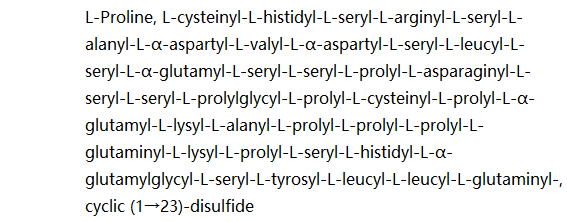Shopping Cart
Remove All Your shopping cart is currently empty
Your shopping cart is currently empty
Adropin (34-76) (human, mouse, rat) is a peptide that attenuates liver fibrosis and insulin resistance independent of obesity or food intake.

| Pack Size | Price | USA Warehouse | Global Warehouse | Quantity |
|---|---|---|---|---|
| 1 mg | $127 | In Stock | In Stock | |
| 5 mg | $328 | In Stock | In Stock | |
| 10 mg | $496 | In Stock | In Stock | |
| 25 mg | $793 | In Stock | In Stock | |
| 50 mg | $995 | In Stock | In Stock | |
| 100 mg | $1,230 | - | In Stock | |
| 200 mg | $1,650 | - | In Stock |
| Description | Adropin (34-76) (human, mouse, rat) is a peptide that attenuates liver fibrosis and insulin resistance independent of obesity or food intake. |
| In vitro | Method: HUVECs cells were treated with 10 ng/mL Adropin for 18 hours, and then Adropin was added to the culture medium; in addition, HUVECs cell line proteins were isolated, and Adropin (10 ng/mL) was added to the culture medium to stimulate for 0 to 60 minutes to lyse the treated HUVECs. The samples were used to measure phosphorylated ENOs, phosphorylated AKT, and phosphorylated ERK1/2. RESULTS Adropin-treated HUVECs cells showed greater proliferation, migration, and capillary-like tube formation; Adropin upregulated endothelial NO synthase expression through the VEGFR2 2-PI3K-Akt and VEGFR2-extracellular signal-regulated kinase pathways to reduce inflammation. [3] Method: Treat 3T3-L1 cells or rat primary preadipocytes with Adropin (1 - 100 nmol/l) for 24 or 48 hours. After that, add BrdU solution (10µmol/l), incubate the cells for 3 hours, and use Cell Proliferation BrdU Elisa Kit (Roche Diagnostics, Penzberg, Germany) evaluates the binding of BrdU to DNA. RESULTS Adropin (100 nmol/l) stimulated the proliferation of 3T3-L1 preadipocytes after 24 and 48 hours. Adpin at a concentration of 100 nmol/l increased the proliferation of rat preadipocytes after 48 hours; in addition, Adropin stimulated the proliferation of rat preadipocytes through ERK1 /2 and AKT-dependent mechanisms promote 3T3-L1 cell proliferation. [4] |
| In vivo | METHODS: DIO C57BL/6 mice maintained on a 60% kcal fat diet received five intraperitoneal (ip) injections of adropin (450 nmol/kg). After treatment, assess glucose tolerance and systemic insulin sensitivity. RESULTS Adropin treatment improved glucose tolerance, enhanced insulin action, and enhanced metabolic flexibility in glucose utilization in mice. [1] METHODS: C57Bl/6 mice were injected with secretable form of Adropin (450 nmol/kg, ip) three times within 24 hours, then fasted, and the hearts were isolated and perfused. RESULTS Adropin administration improved cardiac function, cardiac efficiency, and coronary blood flow compared with untreated mice. [2] |
| Cas No. | 1802086-30-1 |
| Color | White |
| Appearance | Solid |
| Sequence | Cys-His-Ser-Arg-Ser-Ala-Asp-Val-Asp-Ser-Leu-Ser-Glu-Ser-Ser-Pro-Asn-Ser-Ser-Pro-Gly-Pro-Cys-Pro-Glu-Lys-Ala-Pro-Pro-Pro-Gln-Lys-Pro-Ser-His-Glu-Gly-Ser-Tyr-Leu-Leu-Gln-Pro (Disulfide bridge: Cys1-Cys23) |
| Sequence Short | CHSRSADVDSLSESSPNSSPGPCPEKAPPPQKPSHEGSYLLQP (Disulfide bridge: Cys1-Cys23) |
| Storage | store at low temperature,keep away from moisture | Powder: -20°C for 3 years | In solvent: -80°C for 1 year | Shipping with blue ice/Shipping at ambient temperature. |
| Size | Quantity | Unit Price | Amount | Operation |
|---|

Copyright © 2015-2025 TargetMol Chemicals Inc. All Rights Reserved.